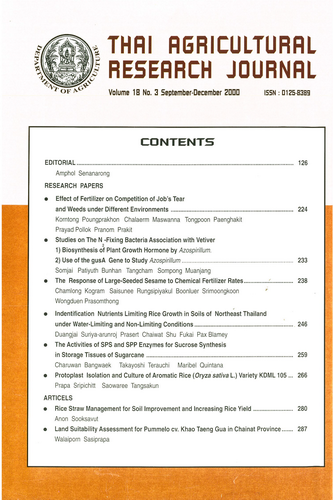Studies on The N2 - Fixing Bacteria Association with Yvetiver 1) biosynthesis of Plant Grwoth Hormone by Asospirillum. 2) Use of the gusA Gene to Study Azospirillum
DOI:
https://doi.org/10.14456/thaidoa-agres.2000.17Keywords:
gus A20, AzospinillumAbstract
1. The N2 -fixing bacteria (Azospirillum) was isolated from soil on vetiver root zone. This Bacteria fix N2 and also produce plant grwoth hormone, indole-3-acetic acid (IAA). Then IAA could be produced in culture media in the laboratory. By inoculating Azospirillum into malic-yeast broth media and grown for 5 days, IAA concentration was determined by the method of Gordon and Wenber (1951), and this supernatant was verified by concentration was determined by the method of Gordon and Weber (1951), and this supernatant was verified by HPLC analysis. The culture was inocultated on young vetiver grown in N-free media. The results indicated that IAA was produced at 30-45 ug/ml in broth media grown Azospirillum plus tryptophan. Plants inoculated with this culture inducted root elongation, increased plant height and biomass.
2. The gusA20 from E.coli was inserted into the genome of Azospirillum. Plate mating was carried out. the transconjugant colonies were expressed by blue colonies and resistance to the ntibiotics on the agar plates. The transconjugant was used to inoculate to inoculate the vetiver root. The results indicated that Azospinrillum grew
Downloads
Published
How to Cite
Issue
Section
License

This work is licensed under a Creative Commons Attribution-NonCommercial-NoDerivatives 4.0 International License.
Thai Agricultural Research Journal



